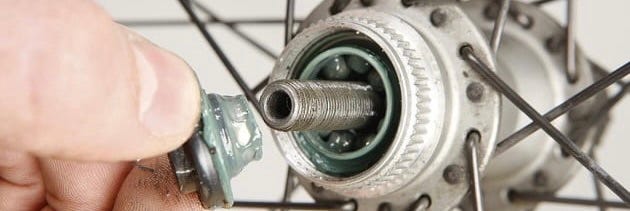Between the wobble and the grind
The wheel of life
Every so often I have to adjust the wheel bearings on my bicycle. The challenge is the same as on every bicycle wheel, every automobile wheel, every train wheel. The bearings have to be loose enough to let the wheel rotate freely, but snug enough to keep the wheel from wobbling. On my bike wheels, the adjustment is made with a tool called a cone wrench. Turn the wrench clockwise—to the right as I face it—and the bearings are snugger, with less play. Turn to the left, and they are looser, with more play. The adjustments have to be made on a regular basis because, no matter how perfect they are at any given moment, the stresses and strains of riding the bike cause the bearings to work their way out of adjustment. Anyway, there's no such thing as a perfect setting. I like my bearings a bit looser than other riders might. I'm willing to accept some wobble in exchange for freer rotation.
I’ve concluded there's a metaphor here. Societies and political systems are like bicycle wheels. They should operate freely but without too much wobble. Government officials and legal authorities make periodic adjustments. Turn the wrench to the right—in a conservative direction— and they reduce the wobble but also the freedom of motion. Turn the wrench to the left—in a liberal direction—and the result is greater freedom but also more disorder. No fix is ever permanent. The stresses and strains of political and social life cause the system to work its way out of adjustment. Anyway, no particular setting satisfies everyone. Conservatives like things snugger than liberals do; liberals accept some wobble to avoid grinding.
The course of American history reveals repeated adjustments. In the 1760s and early 1770s, American colonists concluded that the bearings as set by the British Parliament ground too tight. They loosened them by means of the American Revolution. The wheel of American life spun more freely, but a wobble developed in the early postwar years, with the Shays Rebellion in Massachusetts being the clearest example. Alarmed, a group of Americans wrote a new constitution to tighten the bearings and restore order. A major argument ensued, Federalists said the rightward twist was necessary lest the wheel spin itself to pieces. Antifederalists warned of new grinding. The Federalists won the argument, but the Antifederalist sentiment gave rise to the first opposition party in American political history, the Jeffersonian Republicans. After the Federalists tightened things down with the Alien and Sedition Acts, Jefferson and Madison proposed a loosening remedy in the Kentucky and Virginia Resolutions, and their party ousted the Federalists in the 1800 elections.
And so it went, tightening and loosening, tightening and loosening. Jefferson tried to avoid war with Britain and France by imposing an embargo on American shipping. Madison eased his opposition to banking by accepting a second Bank of the United States. The Missouri Compromise constrained the expansion of slavery. Southerners effected the repeal of the compromise by means of the Kansas-Nebraska Act. Eleven southern states attempted a radical loosening by secession. Lincoln and the Union army ratcheted them down. Gilded Age capitalists pushed the boundaries of democracy as they built their monopolies. Progressive presidents, lawmakers and judges showed them who the boss really was. Calvin Coolidge let business be business. Franklin Roosevelt regulated not only businesses but entire markets and industries. Jimmy Carter and Ronald Reagan deregulated, and Bill Clinton declared the end of big government. The Supreme Court struck down restraints on abortion in the 1970s, only to re-allow them in the 2020s.
The daily question for me as a rider is how often I should adjust my bearings. If I were really finicky, I could tune them every day. But that's too much trouble; I’d never get anywhere. Americans as citizens of a republic face the same question, compounded by the diversity of opinions among voters. Our laws and practices never please everyone. How do we arrive at a choice of settings? And the laws and practices require change over time. How much change? How often?
My rule of thumb is to keep the bike sufficiently in tune to roll along easily, but not to require perfection. There are places I have to be. For us together, we ought to bear in mind that our journey makes the Tour de France look like a sprint. We’ve a long road ahead.


This is a great metaphor and article. Kudos
I feel the same way when I regulate my mechanical watches. Perfection is impossible. I guess that's why some of us love mechanical things like bikes and watches so much. Great article.